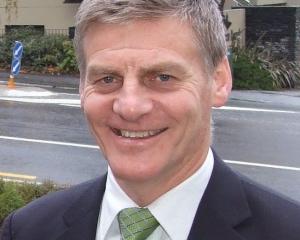Prime Minister John Key might seem a winner, but let's look at the rest of the field.
Rising stars: National's Steven Joyce and Paula Bennett; Labour's David Parker, Grant Robertson, Charles Chauvel, Phil Twyford and Chris Hipkins; the Maori Party's Rahui Katene.
The "we wish 2009 never happened ... please say it never happened" award: Shared by National's Richard Worth, Kate Wilkinson, Melissa Lee and Kanwaljit Singh, and Labour's Phil Goff and Chris Carter.
Quiet achievers: Foreign Minister Murray McCully, Trade Minister Tim Groser and (increasingly) Energy Minister Gerry Brownlee.
Jury's out: Anne Tolley's performance as Education Minister; Shane Jones' chances of becoming Labour's next leader.
Once were farmyard roosters, now feather dusters award: Act's Rodney Hide and the Maori Party's Hone Harawira.
Missing in action: The Greens' new co-leader, Metiria Turei; the Greens in general; large chunks of Labour's front bench.
Gone - but not forgotten: The Greens' Sue Bradford.
Gone - and already forgotten: National's Richard Worth. When it comes to picking the Politician of the Year, there really is no contest.
However, we think the last thing people could be bothered reading in the hectic run-up to Christmas would be another eulogy on the political virtues of John Key.
Suffice to say that on the basis of one measure alone - the polls - Mr Key would win by default.
Throughout the Government's first year in office, National has been consistently rating at 10% or more above the already-lofty 45% the party recorded at last year's election.
That is truly staggering.
However, there is plenty of other material to justify awarding Mr Key the title - a competence twinned with confidence in firmly grasping the role of Prime Minister, a strong instinct for assessing what the public will and will not tolerate, a consequent, never-ending repositioning of National as close to mainstream opinion as more ideologically driven colleagues can stomach, oversight of a Cabinet work programme of quite daunting proportions, overcoming National's longstanding arrogance toward Maori by building a lasting relationship with the Maori Party (and likewise, but less successfully, with the Greens), a capacity for quick but sound decision-making, and lastly, a willingness to be ruthless when necessary.
Just ask Richard Worth.
But enough of all that.
But before "moving on" - a tired euphemism for saying "let's forget about that" and which itself should be "moved on" - let's mention the blunders.
The one wedged in the memory is the appointment of Christine Rankin to the Families Commission.
What possessed Key to go there? Then there is the question of responsibility for National's dreadful campaign in the Mt Albert by-election.
The failure to front on by-election night or ensure someone else of sufficient seniority was present to hold the hand of the unfortunate Melissa Lee at one of the worst moments in her life was about as pretty as watching the lamington being crushed on the head of Act's John Boscawen.
Then there has been the less than perfect day-to-day management of relations with National's support partners.
And Mr Key gets a big black mark for not allowing a flexible Labour Opposition to be party to National's revised emissions trading scheme.
Mr Key has made some big calls - refusing to heed the outcome of the anti-smacking referendum being a prime example.
There has also been arch pragmatism - such as the caving in to motorcyclists when it came to increasing ACC levies.
Perhaps John Key's biggest test was National's response to the recession.
That was adequate rather than exceptional - but probably enough to keep people happy.
The question now is what National will do to meet its promise to make a recovering economy grow at a far faster clip than it has in the past 40 years or so.
That begs a further question.
Which is the real John Key - a poll-driven Prime Minister or a truly reforming one? What we may have been witnessing with both him and his predecessor, Helen Clark, is a new kind of prime minister, a watered-down mixture of manager and reformer, resulting from the constraints of MMP.
But enough of all that.
In the interests of promoting more competition - something with which, as a National MP, Mr Key would presumably agree - the rules have been amended so no-one can take the award two years running.
That change has been backdated to last year when Mr Key was the winner.
But again, as a pragmatic politician, Mr Key would have little trouble swallowing that, would he?Something else which will take little swallowing will be the bottles of "JK"-labelled premium Central Otago Prime Minister's pinot noir that landed on office desks around the parliamentary complex this week.
Without even opening a bottle, we figure this isn't cheap plonk.
A rough estimate would suggest that the 20 cases Mr Key ordered would have set him back $5000.
Still, a nice gesture.
But we will not be swayed.
The rule change stays.
When it comes to Politician of the Year, it is difficult to go past Tony Ryall.
The Health Minister has hardly put a foot wrong in a portfolio which traditionally has been a political graveyard.
Mr Ryall's political management in his portfolio has been exemplary, first with respect to the swine flu scare and then with the Labtests fiasco in Auckland.
He has worked out that an ageing population is more worried about getting adequate treatment and no longer so concerned about whether it is done in a public or private hospital.
The title goes to Tony Ryall in John Key's forced absence.
Which brings us to another bouquet ...
Backbencher of the Year: Act's John Boscawen, who deserves recognition notably for understanding - unlike one or two of his Act colleagues - that politics is the art of the possible.
The Saturday political column will return when politicians do next month.
John Armstrong is The New Zealand Herald's political correspondent.




